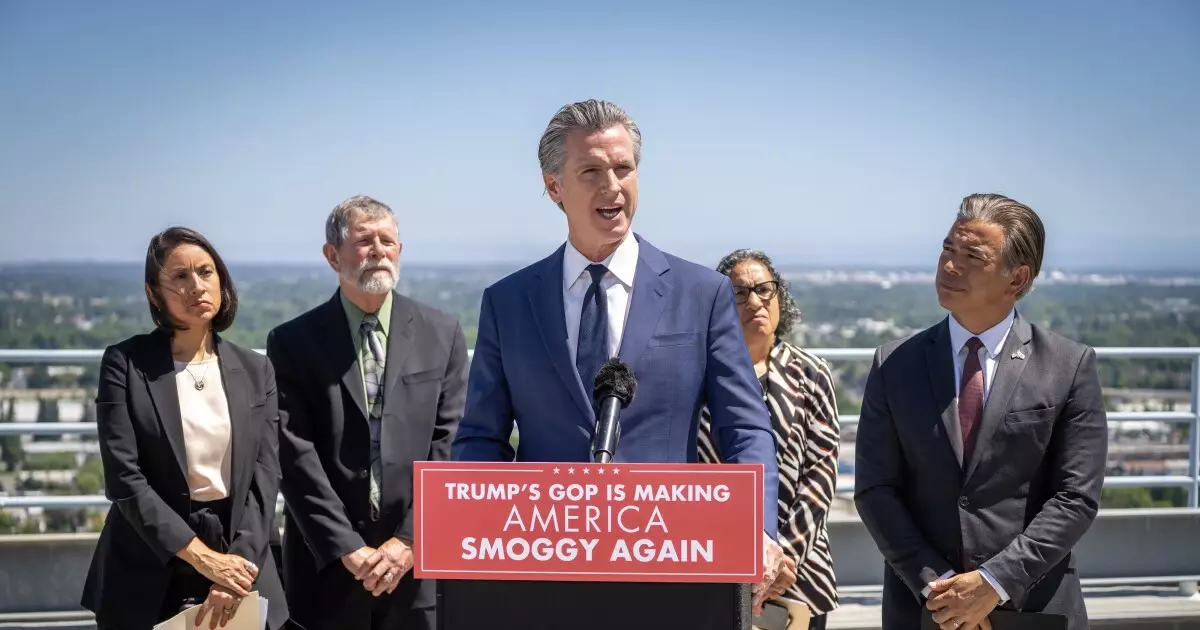The escalating conflict between state and federal regulations is back in the spotlight, particularly with California’s bold stance against the Trump administration. The state, known for its progressive environmental policies, has chosen to challenge recent efforts by the federal government to dismantle vehicle emission standards that have long set benchmarks for air quality in the United States. This isn’t merely a disagreement over regulations; it reflects a deeper philosophical war over state autonomy and the legitimacy of climate action in an age when such matters should transcend party lines.
As California prepares to initiate its 23rd lawsuit against the Trump administration, it highlights the dissonance between state ambitions and federal interests. Governor Gavin Newsom, in light of President Trump’s impending legislation to revoke California’s emission waivers, has reinforced the idea that this is not just a legal battle, but a fight for public health and environmental integrity. His assertion that this move is shortsighted echoes the sentiments of many who recognize that a clean environment should not be a partisan issue.
Historical Context: A Tradition of Environmental Leadership
Historically, California has enjoyed a unique position within the framework of U.S. environmental policy. Since the passage of the Clean Air Act in 1970, the state has been granted over 100 waivers by the Environmental Protection Agency (EPA) to enforce stricter emissions standards than those mandated federally. This legacy of progressive governance is rooted in a bipartisan culture that once saw Republican presidents like Richard Nixon and Ronald Reagan championing clean air initiatives.
By dismantling these standards, the Trump administration is not merely undermining California; it’s signaling a departure from the bipartisanship that has historically underpinned national environmental efforts. Such actions can weaken California’s efforts to combat air pollution, especially when an unacceptable proportion of its population suffers from conditions exacerbated by poor air quality, including asthma and cardiovascular diseases.
The Economic Implications of Reversing Emission Standards
The proposed legislation threatens not just the environment but also California’s economy. With the increasing urgency to transition toward electric vehicles (EVs), reversing stringent emission standards could inhibit California’s leadership in this burgeoning sector. In a global economy where climate change is driving technological innovation, allowing other countries, particularly China, to leap ahead in EV manufacturing could have catastrophic long-term economic implications.
California has actively carved out a niche as a leader in the green economy, creating jobs in sectors that will define the future. Trump’s attempt to roll back regulations could lead to a ripple effect, where the state’s innovation momentum is stunted, and opportunities for emerging technologies are lost. Furthermore, considering that millions of jobs are tied to these green initiatives, a regression in policy could threaten livelihoods across the board.
The Health Risks of Regressive Policies
The health risks associated with loosening vehicle emission regulations cannot be overstated. As recent statistics reveal, California still harbors cities that rank among the top ten in terms of air pollution in the United States. Proposals to weaken emission controls disregard the harsh realities faced by residents who contend with the annual health consequences of smog and poor air quality.
California officials are emphasizing that a cleaner environment is one of the best investments in public health. They argue that reducing emissions is crucial to curbing the alarming statistics related to respiratory diseases. The ramifications of such a legislative rollback could introduce a resurgence in pollution-related health crises, directly impacting vulnerable communities throughout the state.
The Path Forward: A Resistance Fueled by Innovation
While it’s easy to lament the action being taken by the Trump administration, what remains evident is California’s resilience and the ongoing commitment of its leadership to protect both its citizens and the environment. The fight against regressive federal policies has ignited a renewed sense of determination among Californians to innovate and push for sustainability.
In a practical sense, California’s legal showdown could galvanize other states to take similar stances, uniting them in a broader movement toward progressive environmental laws. This isn’t just about California; it’s about establishing a precedent that prioritizes public health over corporate interests, ensuring that future policies reflect the urgent need for climate action.
In this ongoing battle, California stands firm, insisting that forward-thinking policies must guide the future—because in the end, the stakes couldn’t be higher.


Leave a Reply